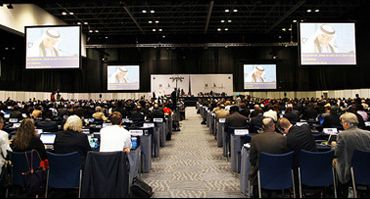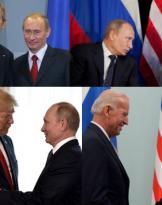The blatant process of decentralization of the distribution of power and the propagation of centers of command and of geopolitical influence is the result of globalization.
Multi-polarity is the main cause of erosion to the Sovereign State, with the proliferation of non-state actors assumed as protagonists of international relations. The reason for this change is identifiable in the growth of computer networks and, more generally, of communications.
Technology has facilitated the strengthening of political caste at a global level, where managing financial transactions and implementing weapon systems embodied supremacy. The spread of low-cost electronic networks has harmed this state of affairs, facilitating the geopolitical decentralization in the virtual space for the affirmation of a power parallel to the institutional one. The constant search for supremacy on the net could collide between the main actors, generating a new type of confrontation fought on the internet.
Foreign policy cannot ignore the knowledge of the adversaries and even less of the allies. The asymmetry of the threat could, however, establish impromptu communions of intent, above all because of the profound difficulties of curbing cyber attacks. For this reason, it is likely that international cooperation could play a fundamental role in combating this phenomenon, in this matter the collaboration between NATO and the European Union is already active, where Italy plays a predominant role that it intends to pursue also in the long term with investments in the defense sector.

The allocation of the appropriations provided for in the Stability Law, based on what is reported in the definitive text, can be only conceivable for the moment, the actual investments will be possible to evaluate them precisely only in the first part of the 2014, but some passages are quite interpretable: between these, the supply of money for the electronics sector could mean the development of cyber war. This is the union of all the activities that anticipate the conduct of military operations. This means the destruction of information and communication systems opposing with attacks on servers in order not only to listen to the transmissions, but also to replace the contents of the same with indications manipulated to the detriment of the intercepted. The ability to manage information and the undue acquisition of data may constitute new hierarchies of power with surgical actions capable of altering the sources of knowledge on which contemporary societies are based.
In the 2007, Estonia was the object of a devastating cyber attack that involved both the public and private sectors without distinction. This set out a new war scenario that had to be regulated and NATO invited a group of experts to Tallinn, Estonia, who created the so-called Tallin Manual. This mainly defines the action algorithms in anticipation of aggression: acts aimed at the avoidance of computer systems; complex cybernetic operations such as to cause not only destruction of materials but also effects that can be extended to a weakening of the opposing armed forces, putting their lives in danger; indiscriminate events to the detriment of personnel not directly involved with hostilities.
 These passages were discussed in the General Assembly of the United Nations of the 2012, where the risks connected to cyber attacks against sites such as power grids or nuclear plants were assessed, with the consequent impact on the civilian population. To regulate the indistinct use of cyber warfare, rules were identified mostly related to deterrence, where the state affected by an illegal cyber aggression, whose effect is comparable to an armed intervention, ie with human losses, can exercise the right to self defense even with conventional weapons.
These passages were discussed in the General Assembly of the United Nations of the 2012, where the risks connected to cyber attacks against sites such as power grids or nuclear plants were assessed, with the consequent impact on the civilian population. To regulate the indistinct use of cyber warfare, rules were identified mostly related to deterrence, where the state affected by an illegal cyber aggression, whose effect is comparable to an armed intervention, ie with human losses, can exercise the right to self defense even with conventional weapons.
The Russian authorities have defined the text of the manual as a document which, by providing for actions and reactions, can legitimize a new type of conflict. On the contrary it would be necessary to remove the danger of the virtualization of virtual space, but already since the 2010 the Americans have composed the Defense Department's Cyber Command, framed as a sub-division of the Strategic Command, in order to implement defensive capabilities and improve techniques to launch cyber-attacks. In cooperation with the secret services, the Cyber Command has access to 15.000 computer networks in 4000 military bases distributed in 88 Countries and will have a staff of a thousand qualified personnel to defend the Nation. Even Great Britain has established a new unit, with the specific intention of developing an offensive capacity, for the purpose of deterrence. The economic outlay has been significant, but it has already produced positive results: in fact, according to official data from the Defense, Great Britain has evaded around 400 thousand threats in the 2012 alone, addressed for the 93% to the most important industrial groups.
Estonia has declared itself the first victim of this new war frontier, indicating as guilty the Russian Federation, but without being able to prove it, as the US and Israeli government have declined the accusations addressed to them for cyber interference, with Flame viruses and Stuxnet, to the Iranian right to develop the process of nuclearization. The Stuxnet caterpillar represented a generational leap as it seems that it managed to infect 45.000 Siemens industrial control systems, facilitating the raiders to manipulate the technical processes of nuclear plants.
The market for improving IT resources is worth 10 billion dollars and tends to the development of tools suitable for the destruction, interdiction, degradation and usurpation of mapping networks, as specified in a document by the USAF. So the cyber war is definable as a new level of confrontation, where the simplest weapon can be a USB key. In the 2008 with the help of this simple tool, one of the strongest attacks against US military computers was launched. A spy connected a USB stick to a laptop on a US base in the Middle East and penetrated all classified systems. A digital bridgehead, from which thousands of data were transferred under the control of another nation. An act that is configured as a capacity to influence the work of the target nation, and can also become political and tactical on the perception of the information itself as well as on the technological projects in place. It is a passage from the war of annihilation to the new concept of operations other than the classical war, which could generate unpredictable psycho-social effects, where the security of the individual would not be guaranteed, therefore comparable to the danger of a nuclear conflict. A non-war fought in virtual space where victory is more representative of a military battle, or, quoting Luttwak, the post-heroic war. The latter probably cannot disregard the financial system and technological development, in particular that applied to trade and services. In fact, computer weapons could be civilian capabilities and identities.
The goal of disinformation and cyber warfare is not to destroy the opposing state, but a psychological action against the enemy in its own territory. A communication policy aimed at demotivating the competitor, but at leaving its resources intact.
An ancient concept, dating back to Sun Tzu, ignored in conventional wars, but taken up in the contemporary world, where safeguarding the antagonist's technological and natural resources, to be drawn from the winner's side, represent the new philosophy of conquest. At the beginning of 2013, in the Meeting on world risks presented by the World Economic Forum, the asymmetric conflict of information technology turned out to be a technological and geopolitical threat, which could tend to the failure of the global government, where the cyber war could turn into a weapon for disinformation through the internet or even at the disposal of terrorists. This scenario is defined as: uncontrolled digital fire in a hyperconnected world. Ultimately, this results in causing chaos in the real world, in the incorrect use of an open system and simple access like the internet.
 The information war has set itself operations on social psychology, that is to influence the emotions and motivations of the antagonist so as to be able to control and prevent behavior. The most aggressive actors, however, are still the States, because espionage and cybernetic sabotage still need the determination and cost-benefit logic of a nation. A different conception of conflicting relations between states, a cognitive capacity that through electronics and information tends to produce consents both at home and on opponents. The cyber attacks by their nature can occur between all the parties involved and against each of them. The same subjects could become from attackers to attackers, where the goals will be the States and the trespassing in the privacy of individual citizens and businesses. This scenario will result in the necessary growth of internal security control, making the concepts of security and defense superimposable.
The information war has set itself operations on social psychology, that is to influence the emotions and motivations of the antagonist so as to be able to control and prevent behavior. The most aggressive actors, however, are still the States, because espionage and cybernetic sabotage still need the determination and cost-benefit logic of a nation. A different conception of conflicting relations between states, a cognitive capacity that through electronics and information tends to produce consents both at home and on opponents. The cyber attacks by their nature can occur between all the parties involved and against each of them. The same subjects could become from attackers to attackers, where the goals will be the States and the trespassing in the privacy of individual citizens and businesses. This scenario will result in the necessary growth of internal security control, making the concepts of security and defense superimposable.
A virtual conflict was suffered by South Korea, where ATMs and websites were targeted. Initially it seemed a simple disservice caused by the overcrowding of traffic; only when the event lasted did the evidence of an aggression of the so-called cybernetic warriors appear. The first datum that emerges is the temporal advantage of a cyber attack, since the target State needs a certain amount of time before being able to ascertain the source of the problem, this facilitates the destruction of the data stored on the hard disks. The second evidence is the non-absolute lethality of a cybernetic attack where, at least in the South Korean case, the systems were recovered in a few days.
So if these attacks are relatively simple to carry out, the damage caused can be recovered quickly, but it must be emphasized that the target state, even in the short period of cyber obscuration, is extremely vulnerable as it is totally defenseless. Cyber piracy is also easy to predict: history in fact shows that following a political-military dispute, an episode of undue intrusion into computer networks occurred, so this justifies the development of a defensive system. An example is in the massive violations of Georgia's servers during the crisis with Russia, the latter succeeded in undermining the Georgian's communication skills.
As shown by the attack on South Korea, the cyber war is also extended to civilian companies, effectively transforming the financial sector and companies into a new and more unpredictable battlefield. In order to obtain concrete results, in order to stem the computer interference, it is desirable that a collaboration relationship be established between the private sector and the governments, to develop effective defense strategies, combining the experience and technological innovation of the two sectors, in order to prevent, but also to coordinate, a common reaction to an event of denial to the services distributed on the network. The forced acquisition of sensitive data, means the transfer of the secrets of a nation, depriving it of its technological wealth in favor of hostile elements.
A network regulation project was presented during the World Economic Forum, held in Davos in January 2014. The Global Commission on Internet Governance, following what has been argued in the Swiss city, will study solutions on censorship and surveillance, simultaneously promoting a consultation platform through institutional and academic channels to identify the necessary future strategies in order to facilitate the States that they mean virtual space as an opportunity for growth and free and open media exchanges. Since the last legislation, the Italian Government has authorized the formation of a section dedicated to the defense of virtual space. The cyber security core is chaired by the Military Councilor of the President of the Council.
The impact of the internet on the economy and on society can be made explicit on the repercussions following the Egyptian Government's decision to obscure the network during the social uprising of February 2011: the OECD, estimated a loss on trade equal to the 3-4 %, with a value of around 90 million dollars. The centrality of the internet and the implications that could arise from its interruption would therefore prevail over finance until it invaded geopolitics. The governance of the network is mainly from ICANN, Internet Corporation for Assigned Names and Numers, which divides the internet into spaces to be assigned to local authorities which in turn distribute IP addresses to various Providers. Therefore, the renewal process will probably have ICANN's initial objective as the control of the activity itself and of the board of directors on which state supervision is necessary, because it is a private non-profit company and the general orientation seems to be to maintain it such.
 In the ITU conference held in Dubai, the member countries fragmented into well-defined geopolitical areas, in particular the US and some Western countries departed in the proposal of a direct intervention of the same ITU in internet governance, revealing an ideological opposition with Russia, China, Arab and African countries, not only on the contents of the conference but on network control methodologies. The Dubai Treaty will enter into force in the 2015, so it is plausible to suppose that there may be a rapprochement between the contenders and bring the reforms decided in Dubai: corrections to ICANN policy; implement international rules for telecommunications designed to guarantee respect for human rights; regulate access to network services. The latter is the weapon through which cybernetic attacks can be unleashed and information can be managed, the Internet regulation will not deny access to the pirates of the virtual space, but will limit the consequences that may arise from driven convictions whose coercion is superimposable on the use of weapons.
In the ITU conference held in Dubai, the member countries fragmented into well-defined geopolitical areas, in particular the US and some Western countries departed in the proposal of a direct intervention of the same ITU in internet governance, revealing an ideological opposition with Russia, China, Arab and African countries, not only on the contents of the conference but on network control methodologies. The Dubai Treaty will enter into force in the 2015, so it is plausible to suppose that there may be a rapprochement between the contenders and bring the reforms decided in Dubai: corrections to ICANN policy; implement international rules for telecommunications designed to guarantee respect for human rights; regulate access to network services. The latter is the weapon through which cybernetic attacks can be unleashed and information can be managed, the Internet regulation will not deny access to the pirates of the virtual space, but will limit the consequences that may arise from driven convictions whose coercion is superimposable on the use of weapons.
The goal of information control is to damage the cognitive system, therefore no longer the body but the mind, or to establish a perception of the altered identity of a person or an organization. The result on the distribution of images, symbols or information represents a strong unknown; in fact it is predictable, but not certain, the decoding that the receivers will assign to the individual events: based on the cultural heritage, religious beliefs, social class of belonging, the personal economic condition and the society in which they live, each individual subject would have a different perception of the false media reality that we want to impose on them, so the reactions might not be the planned ones and the implications would be inscrutable. In fact, the effects on cognitive manipulation actions would lead to multiple and undeterminable implications. A threat that would extend to all nations, even those with undeveloped economic and technological resources. Danger that increases exponentially in those countries with poor national homogeneity or strongly divided between cultural and religious ethnic groups. The main actors of the international scenario, with the aid of cognitive and cybernetic warfare tend to slow down the development of an evolved nation by destroying its technologies, a competitive advantage of specific weight important in the context of post-heroic war.
To balance regional and global imbalances, nuclear deterrence has also been hypothesized: that is, to create a compensation between states based on weapons of mass destruction that can be transmuted into a cognitive balance. Nuclear equalization would not in any case exclude cybernetic interference, but would be annulled in regional micro-conflicts, whose causes sometimes seem distant from the dominant logic of technologically and economically advanced countries. The nuclear proliferation of a single State would have a strong impact on the society of the Nation itself, with the risk of the emergence of groups with a strong identity, pervaded by a superego such as to induce them to accept the total destruction and therefore of themselves, as rational tool to reach the established goal.
Giovanni Caprara
(photo source: NATO, US Army, US Navy, ITU)
REFERENCES
Roberto Di Nunzio: consequences on the internal security of the information war, Gnosis.
Lorenzo Maria Pupillo: Telecom Italia technical newsletter.
Stefano Epifani: Security: the World Commission on Internet Governance, Tech Economy is born.
Luca Bellocchio: international relations and global politics.
Giovanni Caprara is a scholar of international and geopolitical politics. In the 2010 he published the techno-thriller "Nuclear Target" published by Edizioni Progetto Cultura. Collaborate with magazines and online publications.












